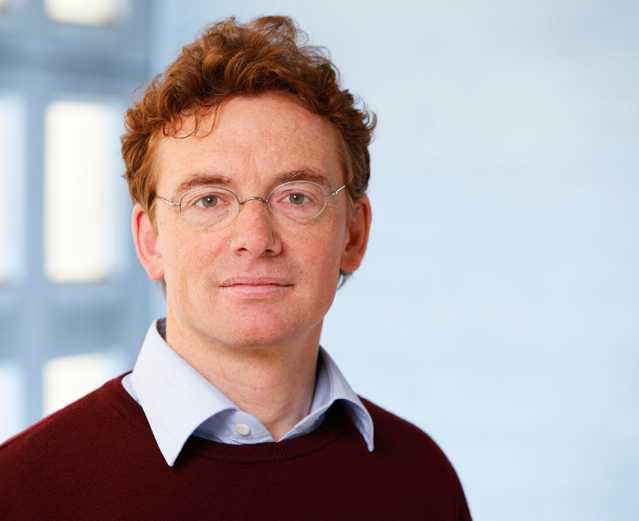Approaching the inexplicable
For his basic research in molecular spectroscopy Frédéric Merkt, Professor of Physical Chemistry, has received a number of awards. His research career began with a blessing in disguise.

A brief moment of inattention set the course of the career of Frédéric Merkt, Professor of Physical Chemistry. On the very day he wanted to inscribe for a degree in medicine, he was stuck in military arrest. He recollects, “I had lost pieces of my equipment and had to spend the day reserved to inscribe at university ‘behind bars’ and could not inscribe on time. Despite the many years that have since passed, he appears still slightly embarrassed.
His first choice was the university of Neuchâtel where he had attended high-school. But this and other Swiss universities were not flexible about late registrations. “Only ETH was prepared to make an exception and accepted me”, says Merkt. The 47-old, sitting in his office full of scientific literature, smiles when he thinks back to this mishap before he started his studies.
The problem was that ETH didn’t offer a degree course in medicine. “I thought about what came closest to medicine and chose chemistry.” Looking back, what sounds like a misfortune was in fact a blessing. He has remained faithful to chemistry. And to ETH: seven years after graduating in chemistry, he returned as an Assistant Professor and since 1999 he has held a Chair of Physical Chemistry.
Studying special molecular states
Merkt describes himself as not particularly media-oriented. At first glance his basic research in the field of molecular spectroscopy may not seem suited to attract the interest of a broad public. He and his team are interested in how molecules behave in isolation (for instance in the gas phase). The particular focus of his research is on Rydberg states: electronically highly excited states of atoms and molecules which can be regarded as consisting of a negatively charged electron moving around a positively charged atomic or molecular ion core in a distant orbit.
Another focus of his research is photoionisation, a process by which a photoelectron is ejected from a molecule after absorption of radiation, leaving behind a positively charged particle (ion). This process takes place for instance in the upper atmosphere (in the ionosphere) or in molecular clouds in space. Merkt and his co-workers measure the properties of molecules using high-resolution spectroscopy and study the interaction between molecules and electromagnetic radiation. From the resulting line spectra they can draw conclusions about the properties of molecules and basic chemical processes.
Award-winning research
Merkt never regretted not having studied medicine and has become an absolute expert in his field. Unnoticed by the public at large but highly esteemed by the scientific community, Merkt was presented with a number of important awards for his basic research starting with the national Latsis Prize of the Swiss National Science Foundation and the Alfred Werner Prize of the Swiss Chemical Society in 1999. In the following years he also received the Academy Prize of the Berlin-Brandenburg Academy of the Sciences in 2004, an ERC Advanced Grant in 2008 and in 2010 the William F. Meggers Award of the Optical Society of America and the Carus Medal of the German National Academy of Sciences Leopoldina, to mention just a few. This year he is also to receive the Otto Bayer Prize of the Bayer Science & Education Foundation (see box).
What do the prizes mean to him? “Of course, I am delighted about the awards”, says Merkt. “There are, however, many brilliant researchers who do great things and deserve awards.” He cannot quite explain the accumulation of prizes for his work. This modesty perhaps stems from his passion for research, “I am always happy when I see a molecular spectrum. The wonderful thing is that this happens almost every day.”
Still, Merkt is not the kind of scientist who is only interested in his research and this is confirmed by his second passion: music. A clarinettist, he not only played during but also after completing his studies in ensembles although now he mostly plays with his children. He is particularly fond of the clarinet quintets of Mozart and Brahms.
Highs and lows
The seven-year period between graduating in chemistry and his return to ETH reads like the dream career of a scientist: Cambridge, Paris, Oxford and Stanford. “It may look good on paper but there were also difficult times”, he points out. In the first year of his PhD in Cambridge nothing worked. “Surmounting difficulties and seeing an experiment work after long efforts brings moments of pure happiness in research.” He encourages his students to believe that things always turn out well in the end, provided they really want them to.
There are still many research questions he would like to find answers to. He and his team are currently working on cooling molecules down as far as possible in order to be able to observe them better and longer in an (almost) motionless state. The main objective of his research? “To improve measurements until you reach the point where results can no longer be explained”, says Merkt. Approaching the inexplicable is what science is all about.
Otto Bayer Prize
The prize that comes with EUR 75,000 from the Bayer Science & Education Foundation is deemed to be one of the most prestigious and coveted awards for biochemists and chemists in German-speaking regions. Since 1984 the prize has been awarded in memory of the prize sponsor and discoverer of polyurethane chemistry, Otto Bayer, who died in 1982. The award is presented annually for ground-breaking research contributions in innovative fields of biochemistry and chemistry. The Otto Bayer Prize 2014 is awarded to Frédéric Merkt for his outstanding scientific work in the field of molecular spectroscopy.
Comments
No comments yet